Mauricio Macri
| Mauricio Macri | |
|---|---|
.jpg) Official portrait of Mauricio Macri | |
| President of Argentina | |
|
Assumed office 10 December 2015 | |
| Vice President | Gabriela Michetti |
| Preceded by | Cristina Fernández de Kirchner |
| President pro tempore of the Union of South American Nations | |
|
In office 17 April 2017 – 17 April 2018 | |
| Preceded by | Nicolás Maduro |
| Succeeded by | Evo Morales |
| 5th Chief of Government of Buenos Aires | |
|
In office 10 December 2007 – 10 December 2015 | |
| Deputy |
Gabriela Michetti María Eugenia Vidal |
| Preceded by | Jorge Telerman |
| Succeeded by | Horacio Rodríguez Larreta |
| National Deputy from Buenos Aires | |
|
In office 10 December 2005 – 18 July 2007 | |
| 30th Chairman of Boca Juniors | |
|
In office 27 February 2008 – 1 June 2008 | |
| Preceded by | Pedro Pompilio |
| Succeeded by | Jorge Amor Ameal |
|
In office 3 December 1995 – 4 December 2007 | |
| Preceded by | Antonio Alegre |
| Succeeded by | Pedro Pompilio |
| Personal details | |
| Born |
8 February 1959 Tandil, Buenos Aires, Argentina |
| Political party | Republican Proposal (2009–present) |
| Other political affiliations |
Commitment to Change (2003–2009) Cambiemos (2015–present) |
| Spouse(s) |
Yvonne Bordeu (1981–1991) Isabel Menditeguy (1994–2005) Juliana Awada (2010–present) |
| Children | 4 |
| Parents |
Francisco Macri Alicia Blanco Villegas |
| Residence | Quinta de Olivos |
| Education |
Pontifical Catholic University of Argentina Columbia University |
| Profession | Civil engineer |
| Signature |
 |
| Website | Official website |
Mauricio Macri[1][2] (Spanish pronunciation: [mauˈɾisjo ˈmakɾi]; born 8 February 1959) is the current President of Argentina and has been in office since 2015. A former civil engineer, Macri won the first presidential runoff ballotage in Argentina's history (the runoff system had been introduced in 1994) and is the first democratically-elected non-Radical or Peronist president since 1916.[3] He was chief of government of Buenos Aires from 2007 to 2015, and represented the city in the lower house of the Congress of Argentina from 2005 to 2007. The reintegration of Argentina into the international community is central to Macri's agenda.
Born in Tandil, Buenos Aires Province, Macri is the son of Francesco Macri, a prominent Italian businessman in the industrial and construction sectors, and was raised in an upper class home. He received a bachelor's degree in civil engineering from the Pontifical Catholic University of Argentina and studied at Columbia Business School in New York City.[4] Macri became president of Boca Juniors, one of Argentina's two most popular football clubs, in 1995. In 2005, he created the centre-right Republican Proposal party (Propuesta Republicana, also known as PRO).[5]
Although Macri was a potential presidential candidate in the 2011 general elections, he ran instead for reelection as mayor. He received about 47 percent of the vote in the mayoral election, which led to a runoff election on 31 July 2011 against Daniel Filmus in which Macri was reelected for a second consecutive term.[6] On 22 November 2015, after a tie in the first round of the presidential elections on 25 October, he received 51.34 percent of the vote to defeat Front for Victory candidate Daniel Scioli[7] and was inaugurated on 10 December 2015 in the Argentine Congress.[8] In 2016, Macri was named one of the world's 100 most influential people and the most powerful president in Latin America by the U.S. news magazine Time.[9][10]
Early life
Macri was born in Tandil in the province of Buenos Aires, the son of Italian-born tycoon Fracisco "Franco" Macri (owner of the Philco affiliate in Argentina) and Alicia Blanco-Villegas Cinque.[11] The family moved to Buenos Aires a short time later, and kept their houses in Tandil as vacation properties.[11] His father, and his uncle Jorge Blanco Villegas, influenced Macri to become a businessman, and Franco expected his son to succeed him as leader of his firms. Macri preferred his uncle's company to constant scrutiny by his father. He was educated at Colegio Cardenal Newman,[12] and received a bachelor's degree in civil engineering from the Pontifical Catholic University of Argentina (UCA). At this time Macri became interested in neoliberalism and joined the now-defunct Union of the Democratic Centre and a think tank led by former minister Álvaro Alsogaray.[13] In 1985, he briefly attended Columbia Business School, the Wharton School of the University of Pennsylvania and the Universidad del CEMA in Buenos Aires.[14]
Macri's professional experience began at SIDECO Americana, a construction company which was part of his father's Socma Group holding company, where he worked for three years as a junior analyst and became a senior analyst. In 1984, he worked in the credit department of Citibank Argentina in Buenos Aires. Macri joined Socma Group the same year, and became its general manager in 1985. In 1992, he became vice president of Sevel Argentina (then manufacturing Fiat and Peugeot automobiles under licence in Argentina as part of Socma), and became president two years later.[14]
In 1991, Macri was kidnapped for 12 days by officers of the Argentine Federal Police. Kept in a small room with a chemical toilet and a hole in the roof to receive food, he was freed when his family reportedly paid a multimillion-dollar ransom.[15] Macri has said that the ordeal led him to enter politics.[16]

His first wife was Ivonne Bordeu, daughter of race-car driver Juan Manuel Bordeu. They had three sons: Agustina, Jimena and Francisco. After they divorced, Macri married model Isabel Menditeguy in 1994; Franco requested a prenuptial agreement. Although the marriage reached a crisis when Macri became chairman of Boca Juniors, they did not divorce until 2005. He began a romance with María Laura Groba which did not lead to marriage. Macri left Groba in 2010, began a relationship with businesswoman Juliana Awada[17] and married Awada that year. At the wedding reception, he wore a fake moustache as part of his impersonation of singer Freddie Mercury. Macri accidentally swallowed the moustache, and Minister of Health Jorge Lemus performed first aid to save his life.[18][19]
Boca Juniors
Macri intended to run for chairman of Boca Juniors in 1991, but his father convinced him to keep working at Sevel. He tried to buy the Deportivo Español team, but could not get support from the team's board of directors. Macri supported Boca Juniors, paying coach César Luis Menotti's salary and buying players for the team (including forward Walter Perazzo). Franco, skeptical about his son's prospects for success, finally allowed him to run Boca Juniors. He instructed aide Orlando Salvestrini to work with Mauricio for two reasons: to help him and to monitor his activities. Mauricio met with former Boca Juniors chairmen Antonio Alegre and Carlos Heller, and tried to convince them to work with him; both rebuffed him. Macri later sought the support of other groups in Boca Juniors, eventually winning the team's internal elections.[20]
His first years were unsuccessful; the team's performance was poor, players frequently complained about salaries and bonuses, and Macri changed coaches three times. The only initial improvement was a partial reconstruction of the stadium. He arranged that Boca Juniors worked in the stock exchange, to earn enough money to buy new players. Macri's first coach was Carlos Salvador Bilardo, who brought 14 new players to the team and finished the 1996 Apertura league in 10th place.[21] His second coach, Héctor Veira, also performed poorly.[22] New coach Carlos Bianchi helped Juan Román Riquelme improve his performance, and had Martín Palermo and Guillermo Barros Schelotto as effective forwards. They won the first two tournaments, beginning a record 40-match unbeaten run.[23]
Political career
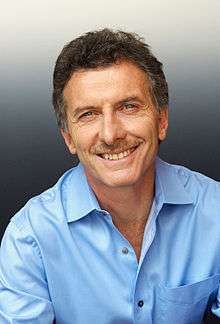
Macri made his political debut in 2003, founding the centre-right party Commitment to Change (Spanish: Compromiso para el Cambio).[24] The party was intended to be a source of new politicians, since the major parties were discredited after the December 2001 riots in Argentina.[25] Later that year, Macri ran for mayor of Buenos Aires. Although he won the first round of the election with 37 percent of the vote,[26] he lost the runoff election with 46 percent of the vote to Aníbal Ibarra.[27] In 2005 Macri joined Ricardo López Murphy of Recrear in a political coalition, the Republican Proposal (PRO), and was elected to the Chamber of Deputies with 33.9 percent of the vote.[28] His campaigns were managed by Jaime Durán Barba.[29] According to a 2007 report, Macri had participated in only 44 of 321 elections; he countered that he had become disappointed with Congress, since bills sent by the president were not open to debate or amendment.[30] Ibarra was impeached and removed from office in 2006 as a result of the República Cromañón nightclub fire, and his term was completed by vice-chief of government Jorge Telerman.[31]
During 2006, Macri alternated his political activities as deputy with his presidency of Boca Juniors. Before the 2007 national elections, he was in discussions with Neuquén Province governor Jorge Sobisch.[32] This conflicted with Macri's alliance with Ricardo López Murphy, who also intended to run for president and had denounced Sobisch for corruption. Later that year, Sobisch's image was severely tarnished when teacher Carlos Fuentealba was killed during a union demonstration in Neuquén. Macri immediately backed out of his pact with Sobisch and remained neutral during the national election,[33] which was won by Cristina Fernández de Kirchner of the Front for Victory (FPV).[34]
In February 2007 Macri announced that he would run again for mayor of Buenos Aires, heading the PRO slate with Gabriela Michetti. In the 2 June 2007 first round, he received 45.6 percent of the vote and defeated government-backed Daniel Filmus (who received 23.8 percent of the vote); incumbent Jorge Telerman finished third. In the 24 June 2007 runoff election, Macri defeated Filmus with 60.96 percent of the vote.[35][36]
For the 2009 midterm elections, he allied with Francisco de Narváez and Felipe Solá. The alliance was successful; De Narvaez defeated Kirchner in Buenos Aires Province and Gabriela Michetti (Macri's candidate) won the city election, setting the stage for Macri's presidential candidacy in 2011. Cristina Kirchner, whose public image was good after the death and state funeral of Néstor Kirchner in late 2010, ran for reelection. Macri instead ran for reelection as mayor; he won the first round on 10 July 2011 with 47.08 percent of the vote against Filmus' 27.78 percent and Fernando "Pino" Solanas, and won the 31 July runoff against Filmus with 64.25 percent of the vote.[37]
Buenos Aires administration
Public transport
.jpg)
Macri's administration worked on public transport in an attempt to reduce auto traffic in Buenos Aires. One project was the Metrobus, a bus rapid transit system added to the city's main streets. By the end of Macri's term as mayor, the 50.5-kilometre (31.4 mi) system had five lines and 113 stations.[38]
Other streets have bikeways to promote cycling, and the city created its EcoBici bicycle-sharing scheme. By the end of Macri's administration, about 155 km (96 mi) of bicycle lanes were constructed and 49 of the planned 200 automated bicycle-sharing stations were built.[39][40]
Several level crossings on the city's commuter-rail network were replaced by tunnels to improve road and rail traffic flow.[41] Under Macri, the city committed to two large rail-infrastructure projects: running viaducts through the center of the city to extend the Belgrano Sur Line, and raising the San Martín Line to eliminate level crossings.[42] Macri proposed the Red de Expresos Regionales project to link the city's main railway terminals and lines with a series of tunnels; construction will begin under Horacio Rodríguez Larreta.[43]
The Buenos Aires Underground, initially maintained by the national government, was the subject of a year-long dispute between Macri and Kirchner. The national government sought to transfer it to the city (which Macri supported), but the budget and length of the transition period were contested. Macri announced that the city would take over the underground on 13 November 2012.[44] Line A, still using wooden cars almost a century old, received a fleet of modern cars from the national government; Line H also received new cars.[45][46] Madrid Metro rolling-stock purchases for Line B were criticised, despite their technical superiority, for being incompatible with the line and costing more than new trains for the city's commuter-rail network.[47]
Metropolitan police
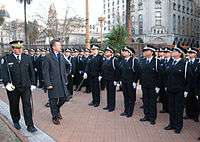
The main police force in the city at the time was the national police, the Argentine Federal Police. Buenos Aires, initially a federal district with limited autonomy, became an autonomous city with the 1994 amendment of the Constitution of Argentina. The Federal Police, under national-government jurisdiction, still worked in the city and disputes over a potential transfer to a local force were unresolved when Macri was elected. He unsuccessfully tried to negotiate a transfer with President Cristina Kirchner. As an alternative, in 2008 Macri proposed a bill for the creation of the Buenos Aires Metropolitan Police to work with federal police in the city. The bill, supported by the Republican Proposal (PRO) party and the Kirchnerite blocs, was rejected by Civic Coalition blocs and those aligned with Aníbal Ibarra. Elisa Carrió thought that Macri had abandoned the transfer request, and Ibarra said that the forces' duties would overlap.[48] The Metropolitan Police began with nearly 1,000 officers; the Federal Police had 17,000 officers working in the city. As a result, the metropolitan police worked on a small scale during the transition and more complex tasks were reserved for the federal police.[49]
Jorge Alberto Palacios was the first chief of the Metropolitan Police. Part of the police unit which rescued Macri from his kidnappers, Palacios was fired by Néstor Kirchner for his alleged involvement in the murder of Axel Blumberg (for which he was acquitted). His appointment was controversial; Palacios had been investigated for concealing evidence of the 1994 AMIA bombing,[50] and he resigned a short time later.[51] The transfer of police protection to the city was completed during the administration of Macri's successor, Horacio Rodríguez Larreta.[52]
Same-sex marriage
.jpg)
A gay couple, José María Di Bello and Alex Freyre, were forbidden to marry in Buenos Aires. According to Di Bello and Freyre, articles 172 and 188 of the civil code (restricting marriage to people of different genders) was unconstitutional; judge Gabriela Seijas agreed, and they married (the first same-sex marriage in Argentina) in 2009. Macri did not appeal the ruling, saying that same-sex marriage was becoming universally accepted and individuals had a right to happiness. He compared the controversy with the sanctioning of divorce during the 1980s after the restoration of democracy in Argentina; highly controversial at first, it was eventually accepted.[53] A federal law permitting same-sex marriage was passed the following year.[54]
Macri's refusal to appeal the sentence affected his relationship with Archbishop Jorge Bergoglio (who later became Pope Francis). Bergoglio opposed same-sex marriage, and expected Macri to appeal the ruling. According to the archbishop, it was not up to a lower-court judge to rule on the constitutionality of a law and Macri should have appealed the ruling in a higher court. Bergoglio was also annoyed by what he considered a lack of communication between him and Macri.[55]
Presidential elections
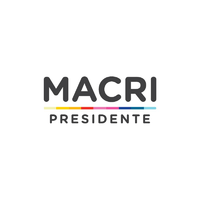
Macri ran for president of Argentina in 2015. With President Cristina Kirchner unable to run, early opinion polls indicated a close three-way race between Macri, Kirchnerite governor Daniel Scioli and Tigre mayor Sergio Massa.[56] Failing to receive enough support, the Broad Front UNEN coalition disbanded; Elisa Carrió and the Radical Civic Union created Cambiemos, a new coalition with the Republican Proposal. Macri supported Horacio Rodríguez Larreta against Gabriela Michetti in the PRO primary elections for mayor of Buenos Aires. Larreta won the primary and general elections, and Michetti was selected as the vice-presidential candidate. Macri declined a political alliance with Massa, and kept María Eugenia Vidal as candidate for governor of Buenos Aires Province.[57]
Macri, Carrió and Ernesto Sanz ran in the primary elections, which Macri won.[58] Preelection polls indicated that Scioli would win by a wide margin, possibly avoiding a ballotage. The final results showed Scioli finishing first with 37.08 percent, just ahead of Macri's 34.15 percent, leading to a ballotage round on 22 November. Massa finished third with 21 percent of the vote, and the other two candidates contended for his voters. Scioli and Macri were polarized about the presidency of Cristina Kirchner; Scioli wanted to keep most Kirchnerite policies, and Macri wanted to change them. In the legislative elections, the Front for Victory (FPV) lost its majority in the Chamber of Deputies but kept it in the Senate.[59]
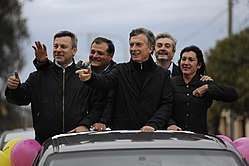
Scioli did not participate in the first presidential debate before the elections, and it was held with the other five candidates. When the ballotage was confirmed, Macri agreed to a presidential debate with Scioli.[60] Two debates were planned: one by the Argentina Debate NGO and another by TV news channel Todo Noticias. Macri preferred a single debate, and opted for the one organized by Argentina Debate.[61]
He criticized Scioli for negative campaigning by the Front for Victory.[62] Several politicians and FPV institutions issued warnings about what might happen if Macri were elected president.[63] According to Scioli, the campaign was intended to encourage public awareness.[64] It was rumored that the campaign might have been suggested by Brazilian João Santana, who organized a similar campaign in Brazil during the ballotage of Dilma Rousseff and Aécio Neves.[65]
The ballotage was held on 22 November. Scioli conceded with 70 percent of the votes counted and provisional results of 53 and 47 percent.[66] The gap between the candidates slowly narrowed over the next few hours, giving Macri a smaller margin of victory than most exit polls suggested.[67] His election ended a dozen years of Kirchnerism in Argentina.[68] Days after the election, United States President Barack Obama telephoned Macri to congratulate him. According to a White House press release, Obama "emphasized the longstanding partnership between the United States and Argentina and conveyed his commitment to deepen cooperation on multilateral issues, improve commercial ties, and expand opportunities in the energy sector".[69]
Presidency
| Presidential styles of Mauricio Macri | |
|---|---|
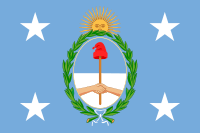 | |
| Reference style | Excelentísimo Señor Presidente de la Nación (Most Excellent President of the Nation) |
| Spoken style | Presidente de la Nación (President of the Nation) |
| Alternative style | Señor Presidente (Mister President) |
Inauguration
Macri announced his cabinet on 25 November 2015, about two weeks before he was due to take office.[70][71][72] The presidential transition was difficult. Macri and Kirchner met briefly; she provided no help to the new administration, and spoke only about the inauguration ceremony.[73] They disagreed about its location; Kirchner wanted it to take place at the Palace of the Argentine National Congress, and Macri favoured the White Hall of the Casa Rosada.[74][75] Plans for violence against Macri supporters near the Plaza during the inauguration were rumoured, and it was unclear who would control the police during the ceremony.[76] Judge Maria Servini de Cubría ruled that Kirchner's term of office ended at midnight on 10 December, and provisional Senate president Federico Pinedo was in charge of the executive branch for the 12 hours between the end of Kirchner's term and Macri's swearing-in.[77] Kirchner left Buenos Aires to attend the inauguration of sister-in-law Alicia Kirchner as governor of Santa Cruz Province that day.[78]
Macri took office on 10 December. He left his apartment in the Recoleta neighbourhood (at the corner of Avenida del Libertador and Cavia) at 11:00 am, walking to the National Congress of Argentina with wife Juliana Awada and four-year-old daughter via the Casa Rosada and the Plaza de Mayo. At 11:41 he entered the legislative chamber, taking the oath of office after Vice President Gabriela Michetti. Macri delivered a 27-minute speech pledging "support for an independent judiciary, to fight corruption and drug trafficking, the internal union of Argentina, universal social protection, a 21st-century style of education and for everyone to have a roof, water and sewer" and greeted his electoral rivals.[79]
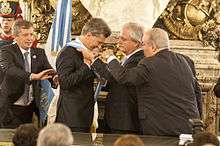
He later went to the Casa Rosada and received the presidential sash in the White Hall from Senate President Federico Pinedo, accompanied by Vice President Gabriela Michetti, Chamber of Deputies President Emilio Monzó and Supreme Court President Ricardo Lorenzetti. Minutes later Macri went to the balcony where thousands of people waited in the Plaza de Mayo, and said: "Argentines deserve to live better, and we are about to start a wonderful period for our country. I promise to always tell the truth and show where our problems are". He called on "all Argentines to follow his administration and alert them when [the government] makes mistakes".[80] After his swearing-in, Macri hosted a reception at the Ministry of Foreign Affairs' San Martín Palace for heads of state Michelle Bachelet (Chile), Horacio Cartes (Paraguay), Juan Manuel Santos (Colombia), Rafael Correa (Ecuador), Evo Morales (Bolivia), Dilma Rousseff (Brazil) and King Juan Carlos I of Spain, and representatives of other countries who attended his inauguration.[81]
Economic policy
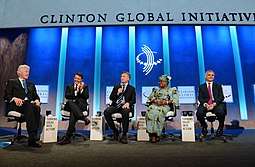
Macri began his presidency with economic difficulties carried over from previous governments. The Central Bank of Argentina's reserves were depleted; inflation was over 30 percent, although the widely discredited National Institute of Statistics and Census of Argentina (INDEC) provided a lower figure. The country had the highest fiscal pressure in history, but the government budget balance had an eight-percent deficit. There had been a sovereign default since 2001, and a conflict existed with hedge funds; tight currency controls had been in place since 2011. Since Argentina is a developing country, a global drop in commodity prices reduced trade revenue.[82]
One of Macri's first economic policies was the removal of currency controls, allowing Argentines to freely buy and sell foreign currencies. Argentina has had a floating exchange rate since then, with intervention from its central bank,[83] and the Argentine peso was devalued by 30 percent.[84] Economists described the move as "perfectly orchestrated".[82] Another early policy was the removal of export quotas and tariffs on corn and wheat.[85] Tariffs on soybeans, the most lucrative Argentine export, were reduced from 35 to 30 percent.[86]
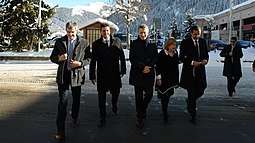
Macri wanted to negotiate with the holdouts and end the default to return to the international capital markets and strengthen the national economy.[87] Argentina offered to pay $6.5 billion to settle lawsuits on 5 February 2016, requesting that the prior ruling on its payments be lifted.[88] The deal would still need to be ratified by the Argentine Congress.[87] Although Cambiemos did not have a majority in either house of Congress, the bill was approved in March and Argentina faced a court hearing in New York on 13 April.[89] The court upheld judge Thomas P. Griesa's ruling, allowing Argentina to pay the 2005 and 2010 bondholders to whom it was still in default.[90] The payment (made with a bond sale)[91] was reportedly the end of the Argentine default, which began in 2001.[92]
On 19 January 2016, Macri attended the World Economic Forum in Davos with opposition figure Sergio Massa and part of his cabinet in a search for investors.[93] He was one of the best-known figures at the meeting, along with Canadian prime minister Justin Trudeau and US vice president Joe Biden.[94] It was the first time Argentina had participated in the forum since 2003, and the last president to attend was Eduardo Duhalde.[95]
During Macri's first year, the economy at large did not recover at the pace expected. Unemployment and inflation remained high and growth didn't come as expected.[96] Kirchner's Careful Pricing price-control program, which benefited small and medium-sized enterprises, was kept with a revision of its included products. The government began several public-works projects to stimulate the economy and help the construction sector.[97] Political intervention in the INDEC figures ended, and the International Monetary Fund declared in November 2016 that Argentine statistics were again in accordance with international standards.[98] The Organisation for Economic Co-operation and Development (OECD) estimated that Argentina would emerge from recession in 2017 or 2018, and lowered its country risk classification from seven points to six.[99]
Macri intends to increase trade with the United States, Europe and East Asia to aid national growth[96] and increase Argentina's digital economy.[96] He planned to eliminate the country's 35-percent tariff on computer, laptop and tablet imports, which makes them three times more expensive in Argentina than in the US and 50% more expensive than in neighbouring Chile, in April 2017.[100]
Energy policy
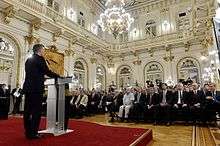
Prices for public utilities such as electricity, gas and water were fixed in 2002 by Eduardo Duhalde during the 1998–2002 Argentine great depression. The Kirchners kept them fixed, and the state subsidized them to compensate for inflation. Investment in the sectors decreased, and their generation and distribution networks suffered. Argentina lost its self-sufficiency in energy, and had to import it instead of exporting its surplus.[101] The cost of energy imports increased the trade deficit and the inflation rate, and power outages became frequent.[102] The Kirchners left the grid on the brink of collapse.[103]
Minister Juan José Aranguren arranged the removal of state subsidies for electricity, gas and water, which caused a huge increase in prices for those utilities. The increases were met with protests in a number of cities by people with banners, bugles and noise-making cacerolazos.[104] Several courts annulled the price increase, since it had been enacted without a public hearing (as required by law). The Supreme Court upheld a temporary halt of the price increase for residential customers in September 2016, which was greeted with relief.[105]
Seeking to increase energy production, Macri signed an investment deal for the Vaca Muerta shale deposit in Patagonia. Roughly the size of Belgium, Vaca Muerta has the second-largest reserve of shale gas in the world. To finalise the deal, the unions negotiated flexibility in labour costs (the main drawback to industrial development in the area). The Neuquén Province government pledged to improve roads and general infrastructure.[106]
Social issues
Macri is pro-life. In a 2014 La Nación interview, he said: "I am in favor of life; I don't think we need to open that debate".[107] However, he said that he would abide by any law sanctioned by Congress regardless of his personal views.[108]
On 16 December Macri met with members of the Qom community and 30 other groups of indigenous peoples. The meeting was held at the Casa Rosada Bicentennial Museum, and the delegation was headed by Qom community leader Félix Díaz. Macri said that the recognition of indigenous communities and support for indigenous peoples are policies of his government.[109]
Foreign relations

During Macri's presidency, Argentina's foreign relations have shifted substantially from those under Kirchner. He immediately proposed action against Nicolás Maduro in Venezuela for human-rights abuses and tried to remove the country from Mercosur.[110] This shift is part of a change in the Latin American pink tide.[111] The other countries in the bloc also opposed Maduro's socialist government, and prevented Venezuela from taking the pro tempore presidency of Mercosur. The bloc seeks a trade and cooperation agreement with the European Union and closer ties with the Pacific Alliance.[112] Macri agreed with Brazilian president Michel Temer to guarantee free trade between their countries.[113] Macri and Temer increased their interest in better trade relations with Mexico, the second-largest economy in Latin America, when the country became involved a diplomatic conflict with US president Donald Trump.[114]

Macri also shifted Argentina's relations with the United States. Barack Obama praised him during a 2016 two-day visit: "I'm impressed because he has moved rapidly on so many of the reforms that he promised, to create more sustainable and inclusive economic growth, to reconnect Argentina with the global economy and the world community". Obama announced that the US would declassify its military and intelligence records of the 1970s Proceso de Reorganización Nacional.[115] Foreign Minister Susana Malcorra supported Democrat Hillary Clinton in the 2016 US presidential election, which was won by Republican Donald Trump. Macri forged diplomatic relations with Trump, tightening control of immigration, limiting the entry of convicted criminals and facilitating the deportation of foreigners who commit crimes. Those limits have been compared with Trump's border policies.[116]
Macri maintains the Argentine claim in the Falkland Islands sovereignty dispute. However, he took a less-confrontational stance towards the United Kingdom and allowed more flights between Argentina and the islands. Although relations between Argentina and the UK have improved, the United Kingdom maintains its claim to the islands and refuses to negotiate.[117]
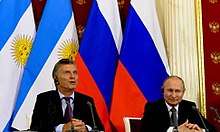
Macri changed Argentina's position on conflicts in the Middle East. During Macri's first week in office he voided the memorandum of understanding between Argentina and Iran which would have established a joint investigation of the 1994 AMIA bombing, a terrorist attack on a Jewish organization for which Argentina has blamed Hezbollah and Iran. The memorandum had been ruled unconstitutional by the judiciary, a ruling which was appealed during Kirchner's presidency. Macri withdrew the appeal, upholding the original ruling.[118] He distanced himself from Iran and encouraged continued investigations of the AMIA bombing and the death of Alberto Nisman, a prosecutor investigating the case.[119] Those cases and Nisman's probe of Kirchner have special importance for Argentina–Israel relations, and ambassador Carlos Faustino García and Israeli diplomat Modi Efraim praised Macri for encouraging the investigations.[120] In July 2016, it was announced that Argentina would grant asylum to 3,000 refugees of the Syrian Civil War.[121]
Controversies
Wiretapping case
Sergio Burstein was the leader of a group of people whose relatives died in the AMIA bombing. Macri was charged in a 2010 wiretapping case, suspected of spying on Burstein and his brother-in-law Néstor Daniel Leonardo. Macri denied the charges. Judge Norberto Oyarbide indicted him, and Federal Chamber members Eduardo Farah, Eduardo Freiler and Jorge Ballestero confirmed the indictment. It was suspected at the time that Macri had organized a clandestine spy network with the aid of Jorge Alberto Palacios and Ciro James. The case was transferred to judge Sebastián Casanello, who ordered further investigation. It was learned that Macri had little knowledge about Palacios' daily activities and his minister, Mariano Narodowski, appointed James. Francisco Macri admitted hiring private agencies to spy on Daniel Leonardo.[122]
Although Casanello dismissed the charges in 2015,[123] Leonardo appealed the ruling; the dismissal was upheld several months later in federal court. Farah, Freiler and Ballestero voted for acquittal; others involved in the case, including Palacios, are still under investigation.[122]
Panama Papers
In 2016 the Panama Papers, 11.5 million documents with details about offshore entities owned by people from many countries, were leaked. Macri was listed as a director of Fleg Trading from 1998 to 2009. He did not declare his involvement in 2007 (when he became mayor) or in 2015, when he became president. Prosecutor Federico Delgado asked the judiciary to determine if Macri "maliciously failed to complete his tax declaration". Macri argued that he did not report his involvement because he was not a stakeholder and did not receive money from it.[124] The company was established by his father to run a failed Brazilian business.[125] Macri owns other foreign accounts with properly-disclosed transactions,[126] and said that he would file a judicial "declaration of certainty" to affirm his statements.[127] A similar company, Kagemusha, was discovered several months later. It was established in 1981 by Francisco Macri, with his 22-year-old son its vice president.[128]
On 20 September 2017, the civil judge Andrés Fraga determined that in the company Fleg Trading Ltd, of the Bahamas, Mauricio Macri only accepted the position of director for which he was appointed to the sole and only effect of designating a replacement and resigning, and that in Kagemusha he did not even accept tacitly the position of director for which he was appointed by Francisco Macri. The ruling adds that neither of the two companies he was a shareholder, that he did not receive any dividends or profits, did not participate in the business decisions or in any business, nor was he the owner or co-owner of any current bank account of the companies.[129]
Detention of Milagro Sala
Gerardo Morales of the UCR was elected governor of Jujuy Province in the 2015 elections. Although the UCR was part of Cambiemos about federal politics, it was allied with Sergio Massa in the province. Morales was the first non-Peronist governor in the province since 1983.[130] He opposed activist Milagro Sala, accusing her of leading a government parallel to that of Eduardo Fellner.[131] According to Morales, Sala led a violent and coercive group and children were forced to join her party to attend school.[132] When he was elected governor, Morales ordered all organizations to operate though banks instead of on a cash basis to retain their legal standing.[133] Sala began a protest in front of the government plaza, but most of her supporters accepted Morales' edict.[134] Prosecutor Viviana Montiel asked local judge Raúl Gutiérrez to order Sala's arrest for causing a disturbance and encouraging crime. Gutiérrez agreed, and Sala was arrested on 16 January 2016.[135]
.svg.png)
After Sala's arrest, she was charged with embezzlement in connection with housing construction. Although her initial charges were dropped, she remained in jail on the later ones. The case generated international criticism, and the United Nations and the Organization of American States asked for her release. Macri said that the case was under provincial, not federal, jurisdiction.[136] The Supreme Court refused to hear the case, which continues in the province.[137]
Orders

- Order of Industrial Merit of São Paulo, Grand Collar, awarded by the Federation of Industries of the State of São Paulo[139]







Ancestry
| Ancestors of Mauricio Macri[146] | |||||||||||||||||||||||||||||||||||||||||||||||||||||||||||||||||||||||||||||||||||||||||||||||||||||||||||||||||||||||||||||||||||||||||||||||||||||||||||||||||||||||||||||||||||||||||||||||||||||||||||||||||||||||||||||||||||||||||||||||||||||||||||||||||||||||||||||||||||||||||||||||||||||||||||||||||||||||||||||||||||||||||||||||||||||||||||||||||||||||||||||||||||||||||||||||||||||||||||||||||||||||||||||||||||||||||||||||||||||||||||||||||||||||||||||||||||||||||||||||||||||||||||||||||||||||||||||||||||||||||||||||||||||||||||||
|---|---|---|---|---|---|---|---|---|---|---|---|---|---|---|---|---|---|---|---|---|---|---|---|---|---|---|---|---|---|---|---|---|---|---|---|---|---|---|---|---|---|---|---|---|---|---|---|---|---|---|---|---|---|---|---|---|---|---|---|---|---|---|---|---|---|---|---|---|---|---|---|---|---|---|---|---|---|---|---|---|---|---|---|---|---|---|---|---|---|---|---|---|---|---|---|---|---|---|---|---|---|---|---|---|---|---|---|---|---|---|---|---|---|---|---|---|---|---|---|---|---|---|---|---|---|---|---|---|---|---|---|---|---|---|---|---|---|---|---|---|---|---|---|---|---|---|---|---|---|---|---|---|---|---|---|---|---|---|---|---|---|---|---|---|---|---|---|---|---|---|---|---|---|---|---|---|---|---|---|---|---|---|---|---|---|---|---|---|---|---|---|---|---|---|---|---|---|---|---|---|---|---|---|---|---|---|---|---|---|---|---|---|---|---|---|---|---|---|---|---|---|---|---|---|---|---|---|---|---|---|---|---|---|---|---|---|---|---|---|---|---|---|---|---|---|---|---|---|---|---|---|---|---|---|---|---|---|---|---|---|---|---|---|---|---|---|---|---|---|---|---|---|---|---|---|---|---|---|---|---|---|---|---|---|---|---|---|---|---|---|---|---|---|---|---|---|---|---|---|---|---|---|---|---|---|---|---|---|---|---|---|---|---|---|---|---|---|---|---|---|---|---|---|---|---|---|---|---|---|---|---|---|---|---|---|---|---|---|---|---|---|---|---|---|---|---|---|---|---|---|---|---|---|---|---|---|---|---|---|---|---|---|---|---|---|---|---|---|---|---|---|---|---|---|---|---|---|---|---|---|---|---|---|---|---|---|---|---|---|---|---|---|---|---|---|---|---|---|---|---|---|---|---|---|---|---|---|---|---|---|---|---|---|---|---|---|---|---|---|---|---|---|---|---|---|---|---|---|---|---|---|---|---|---|---|---|---|---|---|---|---|---|---|---|---|---|---|---|---|---|---|---|---|---|---|---|---|---|---|---|---|---|---|---|---|---|---|---|---|---|---|---|---|---|---|---|---|---|---|---|---|---|---|---|---|---|---|---|---|---|---|---|---|---|---|---|---|---|---|---|---|---|---|---|---|---|---|---|---|---|---|---|---|---|---|---|---|---|---|---|---|---|---|---|---|---|---|---|---|---|---|---|---|---|---|---|---|---|---|---|---|
| |||||||||||||||||||||||||||||||||||||||||||||||||||||||||||||||||||||||||||||||||||||||||||||||||||||||||||||||||||||||||||||||||||||||||||||||||||||||||||||||||||||||||||||||||||||||||||||||||||||||||||||||||||||||||||||||||||||||||||||||||||||||||||||||||||||||||||||||||||||||||||||||||||||||||||||||||||||||||||||||||||||||||||||||||||||||||||||||||||||||||||||||||||||||||||||||||||||||||||||||||||||||||||||||||||||||||||||||||||||||||||||||||||||||||||||||||||||||||||||||||||||||||||||||||||||||||||||||||||||||||||||||||||||||||||||
References
- ↑ "Biografía del Presidente Mauricio Macri". Casa Rosada (in Spanish).
- ↑ "Macri Mauricio, DNI 13.120.469, CUIT 20-13120469-9, BuscarDatos.com".
- ↑ "Mauricio Macri, el primer presidente desde 1916 que no es peronista ni radical" (in Spanish). Los Andes. 22 November 2015.
- ↑ "Qué estudiaron y a qué universidades fueron los candidatos a Presidente". Girabsas. 7 October 2015. Archived from the original on 12 October 2015. Retrieved 7 October 2015.
- ↑ "Los momentos de Mauricio Macri en Boca que marcaron su perfil político". Girabsas. 23 November 2015. Retrieved 23 November 2015.
- ↑ "El jefe de gobierno fue reelecto por amplio margen". www.lanacion.com.ar. Retrieved 24 November 2015.
- ↑ "Balotaje: terminó el escrutinio definitivo y Macri ganó por una menor ventaja". minutouno. 10 December 2015. Retrieved 10 December 2015.
- ↑ "Así juró Macri en el Congreso". Todo Noticias. 10 December 2015. Retrieved 10 December 2015.
- ↑ "List of individuals included in the TIME 100 in 2016". time.com. Retrieved 26 April 2017.
- ↑ ""Time" incluyó a Macri entre las 100 personas más influyentes del mundo". Todo Noticias. 21 April 2016. Retrieved 21 April 2016.
- 1 2 "¿Quién es Alicia Blanco Villegas, la madre de Mauricio Macri?" [Who is Alicia Blanco-Villegas, the mother of Mauricio Macri?] (in Spanish). La Nación. 16 October 2016. Retrieved 22 November 2016.
- ↑ "Los amigos de Macri: del Cardenal Newman y la empresa, al poder", La Nacion, 27 November 2015. (Retrieved 17 June 2016)
- ↑ Todo Macri, pp. 8-10
- 1 2 Mauricio Macri's curriculum vitae, CEMA; accessed 23 November 2015.
- ↑ "Argentina Finds a Kidnapping Ring of Policemen". New York Times. Retrieved 2 January 2016.
- ↑ Faries, Bill (25 June 2007). "Kirchner's Argentina Electoral Losses Fuel Opposition". Bloomberg L.P. Retrieved 31 July 2012.
- ↑ "Las bellas mujeres que fueron pareja de Mauricio Macri" [The nice women who were couples of Mauricio Macri] (in Spanish). Clarín. 22 November 2015. Retrieved 1 December 2016.
- ↑ "Macri, se tragó el bigote y se vivieron momentos de pánico en su casamiento" [Macri, swallowed a mustache and lived moments of panic at his wedding] (in Spanish). El Intransigente. 22 November 2010. Retrieved 5 May 2017.
- ↑ Moore, Jack (11 December 2015). "Who is Mauricio Macri, Argentina's New President?". Newsweek. Retrieved 5 May 2017.
- ↑ Todo Macri, pp. 29-33
- ↑ "En el 96 Boca trajo 15 jugadores y salió en la mitad" (14 February 2015). "En el 96 Boca trajo 15 jugadores y salió en la mitad" [In the '96 Boca brought 15 players and ended in the middle] (in Spanish). Olé. Retrieved 27 February 2016.
- ↑ Leblebidjian, Christian (22 September 1998). "El mejor arranque de Boca" [The best start of Boca] (in Spanish). La Nación. Retrieved 27 February 2016.
- ↑ María Belén Melián (2 June 2011). "El día que cantó las 40" [The day they sang for the 40] (in Spanish). Olé. Retrieved 28 March 2016.
- ↑ Murphy, Martin (25 June 2007). "Profile: Mauricio Macri". BBC News. Retrieved 31 July 2012.
- ↑ Oviedo, Sergio (4 March 2003). ""Voy a ganar porque represento el cambio que todos están pidiendo"" ["I'll win because I represent the change that everyone is asking for"] (in Spanish). Gente. Retrieved 6 December 2016.
- ↑ "Macri le gana a Ibarra y hay ballottage" [Macri defeats Ibarra and there is ballotage] (in Spanish). La Nación. 25 August 2003. Retrieved 6 December 2016.
- ↑ "Macri estableció un nuevo récord en la ciudad" [Macri set a new score in the city] (in Spanish). La Nación. 1 August 2011. Retrieved 6 December 2016.
- ↑ "Macri's profile". Terra.com.ar. Retrieved 31 July 2012.
- ↑ "El gurú de Macri y De Narváez reparte consejos a los políticos". clarin. Retrieved 16 November 2015.
- ↑ Serra, Laura (22 February 2007). "Polémica por una lista de ausencias en Diputados" [Controversy over a list of absences in the chamber of deputees] (in Spanish). La Nación. Retrieved 7 December 2016.
- ↑ Castro, Angeles (8 March 2006). "La Legislatura destituyó a Ibarra" [The legislature removed Ibarra] (in Spanish). La Nacion. Retrieved 7 December 2016.
- ↑ "Macri y Sobisch unen fuerzas con la vista puesta en el 2007" [Macri and Sobisch join forces for 2007] (in Spanish). Clarin. 16 March 2005. Retrieved 31 July 2012.
- ↑ "Macri volvió a tomar distancia del gobernador Jorge Sobisch" [Macri distanced himself again from governor Jorge Sobisch] (in Spanish). La Nacion. Retrieved 31 July 2012.
- ↑ Attewill, Fred (29 October 2007). "Argentina elects first woman president". The Guardian. Retrieved 1 July 2014.
- ↑ Bloomberg.com, 4 June 2007. Macri Expects Run-Off Election Win After First Round Victory.
- ↑ BBC News, 25 June 2007. Profile: Mauricio Macri.
- ↑ "Macri estableció un nuevo récord en la ciudad" [Macri set a new high score in the city] (in Spanish). La Naciòn. 1 August 2011. Retrieved 7 January 2017.
- ↑ Barrett, Chris (10 December 2015). "For Argentine Environmentalists, New President Macri Elicits Hope — and Skepticism". Latin America News Dispatch. Retrieved 11 December 2015.
- ↑ "Cómo funcionará el sistema EcoBici en la Ciudad". Terra. 30 May 2015. Retrieved 11 December 2015.
- ↑ "Ecobici". Buenos Aires Ciudad.
- ↑ Tomino, Pablo (8 April 2014). "Harán otros seis pasos bajo nivel en la ciudad, que serán estrenados en 2015". La Nacion. Retrieved 11 December 2015.
- ↑ Castro, Ángeles (17 December 2014). "Eliminarán 20 pasos a nivel de las líneas San Martín y Belgrano Sur". La Nacion. Retrieved 11 December 2015.
- ↑ "El gobierno porteño anunció una mega estación central de transporte debajo del Obelisco". La Nacion. 8 May 2015. Retrieved 11 December 2015.
- ↑ "Traspaso del subte: un año de idas y vueltas" [Transfer of the underground: a year of comes and goes] (in Spanish). TN. 13 November 2012. Retrieved 25 January 2017.
- ↑ "Preadjudican 105 coches a CNR para la línea A". EnElSubte. 13 May 2013. Retrieved 24 November 2015.
- ↑ "Línea H: abrirán dos estaciones más antes de fin de año". Perfil. 3 October 2015. Retrieved 11 December 2015.
- ↑ "Bochorno: los trenes usados de la B ya costaron más que comprar 0 km". EnElSubte. 30 June 2015. Retrieved 11 December 2015.
- ↑ Gutman, Daniel (29 October 2008). "Crearon la Policía Metropolitana y estaría en la calle a fines de 2009" [The new metropolitan police was created, and it will be in the streets by the ending of 2009] (in Spanish). Clarín. Retrieved 25 January 2017.
- ↑ Gutman, Daniel (30 October 2008). "La nueva Policía podrá efectuar desalojos y controlar marchas" [The new police will be able to control house usurpations and street protests] (in Spanish). Clarín. Retrieved 25 January 2017.
- ↑ Arbiser, Florencia (8 July 2009). "New top cop in Buenos Aires in AMIA probe". Jewish Telegraphic Agency. Retrieved 25 January 2017.
- ↑ "Investigator of Argentinean Jewish center attack resigns". Ynet. Retrieved 25 January 2017.
- ↑ "Larreta to announce new City police". Buenos Aires Herald. 5 October 2016. Retrieved 18 February 2017.
- ↑ Iglesias, Mariana (14 November 2009). "Macri dio un fuerte respaldo al matrimonio entre homosexuales" [Macri gave a strong support to same-sex marriage] (in Spanish). Clarín. Retrieved 18 February 2017.
- ↑ Barrionuevo, Alexei (15 July 2010). "Argentina Approves Gay Marriage, in a First for Region". The New York Times. Retrieved 18 February 2017.
- ↑ Castro, Ángeles (25 November 2009). "Tensa reunión entre Bergoglio y Macri por el matrimonio gay" [Tense meeting between Bergoglio and Macri over same-sex marriage] (in Spanish). La Nación. Retrieved 18 February 2017.
- ↑ "Las últimas encuestas confirman que sigue el triple empate entre Massa y Macri y Scioli" [The last polls confirm the triple draw between Massa, Macri and Scioli] (in Spanish). La Política Online. 22 November 2014. Retrieved 1 September 2015.
- ↑ Rosemberg, Jaime (22 November 2015). "Macri: el gladiador del cambio que sueña con vencer al kirchnerismo" [Macri: the gladiator of change who dreams of defeating kirchnerism]. La Nación (in Spanish). Retrieved 21 November 2015.
- ↑ "Total nacional" (in Spanish). Elecciones argentinas. Archived from the original on 31 August 2015. Retrieved 1 September 2015.
- ↑ Jonathan Watts and Uki Goñi (26 October 2015). "Argentina's presidential election headed for second round after no clear winner". The Guardian. Retrieved 26 October 2015.
- ↑ "Argentina Debate acelera la organización del debate Scioli-Macri: "No tenemos mucho tiempo"" [Argentina debate speeds up the organization of the Scioli-Macri debate: "We don't have enough time"] (in Spanish). La Nación. 27 October 2015. Retrieved 27 October 2015.
- ↑ "Mauricio Macri se bajó del debate organizado por el canal TN" [Mauricio Macri stepped down from the debate organized by the channel TN] (in Spanish). La Nación. 28 October 2015. Retrieved 29 October 2015.
- ↑ Rosemberg, Jaime (2 November 2015). "Macri habló de una "estrategia oscura", pero se centrará en sus propuestas de gestión" [Macri talked about a "dark strategy", but will focus on his proposals] (in Spanish). La Nación. Retrieved 29 October 2015.
- ↑ Olivera, Francisco (3 November 2015). "Extienden a todas las áreas del Estado la campaña contra Macri" [They expand to all state areas the campaign against Macri] (in Spanish). La Nación. Retrieved 3 November 2015.
- ↑ Alfie, Alejandro (3 November 2015). "Con agravios e intimidaciones, comenzó una campaña sucia hacia el balotaje" [The dirty campaign towards the ballotage started with defamations and threats] (in Spanish). Clarín. Retrieved 3 November 2015.
- ↑ "Santana, el experto en el centro de los rumores" [Santana, the expert in the middle of rumors] (in Spanish). La Nación. 2 November 2015. Retrieved 3 November 2015.
- ↑ Catherine E. Shoichet (22 November 2015). "Argentina elections: Daniel Scioli concedes defeat". CNN. Retrieved 21 November 2015.
- ↑ Jonathan Watts and Uki Goñi (22 November 2015). "Argentina shifts to the right after Mauricio Macri wins presidential runoff". The Guardian. Retrieved 21 November 2015.
- ↑ Jonathan Watts and Uki Goñi (22 November 2015). "Argentina election: second round vote could spell end for 'Kirchnerism'". The Guardian. Retrieved 21 November 2015.
- ↑ Walsh, Eric (25 November 2015). "Obama congratulates Argentine President-elect Macri: White House". Reuters. Retrieved 26 November 2015.
- ↑ "Marcos Peña anunció el Gabinete de Mauricio Macri: Prat Gay va a Hacienda y Patricia Bullrich a Seguridad". www.lanacion.com.ar. Retrieved 27 January 2016.
- ↑ Copesa, Grupo. "Mauricio Macri anuncia su gabinete para su gobierno en Argentina". www.latercera.com. Retrieved 27 January 2016.
- ↑ Lalani, Azzura. "Mauricio Macri Announces Future Cabinet". The Argentina Independent. Retrieved 18 March 2016.
- ↑ "Mauricio Macri, después de la reunión con Cristina Kirchner: "No valió la pena"" [Mauricio Macri, after the meeting with Cristina Kirchner: "It was not worth it"] (in Spanish). La Nación. 24 November 2015. Retrieved 3 December 2015.
- ↑ Obarrio, Mariano (2 December 2015). "Crece el conflicto por el lugar de la transmisión del mando" [Conflict grows over where to hold the government handover] (in Spanish). La Nación. Retrieved 17 February 2016.
- ↑ "¿Congreso o Casa Rosada? Dónde debe realizarse el traspaso de mando" [Congress or Casa Rosada: Where should the government handover be held?] (in Spanish). Perfil. 6 December 2015. Retrieved 17 February 2016.
- ↑ Doman, Fabián (6 December 2015). "El entramado detrás de la entrega de la banda y el bastón presidencial". Infobae. Retrieved 28 February 2016.
- ↑ Amato, Alberto (11 December 2015). "Federico Pinedo pasó a la historia como el presidente de 12 horas" [Federico Pinedo passed to history as the 12-hours president] (in Spanish). Perfil. Retrieved 20 January 2016.
- ↑ Manuel, Pablo (11 December 2015). "Alicia Kirchner asumió en Santa Cruz con Cristina y Máximo en primera fila" [Alicia Kirchner took office in Santa Cruz with Cristina and Maximo in the first row] (in Spanish). Perfil. Retrieved 20 January 2016.
- ↑ "Las 20 frases del discurso de Macri durante la asunción como presidente". Clarin. 10 December 2015.
- ↑ "Macri, desde el balcón de la Rosada: "Los argentinos merecíamos vivir mejor"". Clarin. 10 December 2015.
- ↑ "Tras asumir la presidencia, Macri se reúne con las delegaciones extranjeras en el Palacio San Martín". La Nacion. 10 December 2015.
- 1 2 Benedict Mander and Daniel Politi (20 January 2016). "Macri raises hopes for Argentina's economic renewal". Financial Times. Retrieved 18 February 2017.
- ↑ Politi, Daniel (16 December 2015). "President Mauricio Macri lifts Argentina's capital controls". Financial Times. Retrieved 17 February 2017.
- ↑ "Argentina to relax foreign exchange controls". BBC. 17 December 2015. Retrieved 17 February 2017.
- ↑ "Argentina's Macri scraps corn and wheat export quotas". Reuters. 29 December 2015. Retrieved 18 February 2017.
- ↑ "Argentina delays soy export tax cut to 2018 amid budget shortfall". Reuters. 3 October 2016. Retrieved 18 February 2017.
- 1 2 "Argentina reaches $4.65bn deal with holdouts". Financial Times. 29 February 2016. Retrieved 29 February 2016.
- ↑ Stevenson, Alexandra (24 March 2016). "Hedge Funds Dealt Setback as U.S. Sides With Argentina on Defaulted Bonds". New York Times. Retrieved 25 March 2016.
- ↑ Mander, Benedict (31 March 2016). "Argentina clears way for repayment of 'holdout' creditors". Financial Times. Retrieved 31 March 2016.
- ↑ Rafael Mathus Ruiz. "La Corte de Nueva York confirmó la orden de Thomas Griesa para que la Argentina salga del default" [The Court of New York confirmed the order of Thomas Griesa for Argentina to leave the default]. La Nacion (in Spanish). Retrieved 13 April 2016.
- ↑ "US court ruling allows Argentina bond sale to proceed". Financial Times. 13 April 2016. Retrieved 13 April 2016.
- ↑ Bob Van Voris (13 April 2016). "Argentina Wins Court Ruling Letting Bond Sale Proceed". Bloomberg. Retrieved 13 April 2016.
- ↑ Bronstein, Hugh (18 January 2016). "Argentina's Macri will attend Davos forum despite cracked rib". Reuters. Retrieved 18 February 2017.
- ↑ Michael J. de la Merced (19 January 2016). "Trudeau, Macri and Biden Are Among the Big Names at Davos". The New York Times. Retrieved 18 February 2017.
- ↑ "Macri will become first Argentine president to attend Davos forum in twelve years". Merco Press. 7 January 2016. Retrieved 18 February 2017.
- 1 2 3 Bremmer, Ian (21 October 2016). "Argentina's Mauricio Macri on the Challenge of Change". Time. Retrieved 18 February 2017.
- ↑ García, Raquel (5 January 2017). "Macri Maintains Kirchner Era Price Controls in Argentina". Panam Post. Retrieved 18 February 2017.
- ↑ García, Raquel (10 November 2016). "IMF Deems Argentina's Statistics Credible Again". Panam Post. Retrieved 18 February 2017.
- ↑ García, Raquel (29 November 2016). "Argentina's Economy to Pull Out of Recession over Next Two Years". Panam Post. Retrieved 18 February 2017.
- ↑ "Argentina in April will lower 35% tariff on computers and laptops imports". Merco Press. 21 February 2017. Retrieved 18 February 2017.
- ↑ Webber, Jude (14 July 2011). "Argentina restricts foreign trade". Financial Times. Retrieved 22 September 2016.
- ↑ "Blackouts continue in Argentina while government keeps threatening power distributors". Merco Press. 27 December 2013. Retrieved 22 September 2016.
- ↑ Otaola, Jorge (9 July 2016). "Argentina's Macri defends energy rate hikes after court injunction". Reuters. Retrieved 18 February 2017.
- ↑ "Argentina's economy: a battle over utility bills is president Macri's first big crisis". Merco Press. 15 August 2016. Retrieved 18 February 2017.
- ↑ "Protestan contra el tarifazo a metros de la audiencia pública por el gas" [Protests against the tax increase at meters of the public audience for the gas distribution] (in Spanish). La Nación. 16 September 2016. Retrieved 24 October 2016.
- ↑ Mander, Benedict (10 January 2017). "Argentina strikes $15bn a year shale investment deal". Financial Times. Retrieved 18 February 2017.
- ↑ "Mauricio Macri, sobre la despenalización del aborto: "Estoy a favor de la vida; no creo que haga falta abrir ese debate"". La Nacion. Retrieved 19 November 2015.
- ↑ "Mauricio Macri desautorizó a Durán Barba por sus dichos sobre el papa Francisco y el aborto" [Macri discharges Durán Barba for his words about abortion]. La Nación (in Spanish). 20 November 2015. Retrieved 21 November 2015.
- ↑ "Mauricio Macri: "Vamos a trabajar juntos para atender las necesidades de los pueblos originarios"". La Nación. 17 December 2015. Retrieved 17 December 2015.
- ↑ Jonathan Watts and Uki Goñi (22 November 2015). "Argentina president-elect pledges radical policy changes in shift to right". The Guardian. Retrieved 9 February 2017.
- ↑ Caistor, Nick (11 December 2015). "Latin America: The pink tide turns". BBC. Retrieved 12 June 2016.
- ↑ "Mercosur in a state of disarray; Venezuela's presidency disavowed by Argentina, Brazil and Paraguay". Merco Press. 2 August 2016. Retrieved 9 February 2017.
- ↑ "Temer and Macri meet next week to make Mercosur an effective free trade space". Merco Press. 4 February 2017. Retrieved 16 February 2017.
- ↑ Soto, Alonso (7 February 2017). "Brazil, Argentina push for closer trade with Mexico in Trump era". Reuters. Retrieved 16 February 2017.
- ↑ Jeff Mason and Richard Lough (24 March 2016). "Obama praises Argentina's 'man in a hurry' Macri for reforms". Reuters. Retrieved 16 February 2017.
- ↑ Simón Romero and Daniel Politi (4 February 2017). "Argentina's Trump-Like Immigration Order Rattles South America". The New York Times. Retrieved 16 February 2017.
- ↑ "Argentine president mentions Falklands in brief chat with Theresa May". The Telegraph. 21 September 2016. Retrieved 16 February 2017.
- ↑ JTA (14 December 2015). "New Argentina government voids pact with Iran on AMIA bombing". Times of Israel. Retrieved 25 April 2016.
- ↑ Gardner Lange and Toby Dershowitz (18 January 2017). "Honor Alberto Nisman's sacrifice by continuing his probe of Iran". Jewish Telegraphic Agency. Retrieved 16 February 2017.
- ↑ Newman, Marissa (18 January 2017). "Knesset remembers Argentine prosecutor Nisman amid hopes for breakthrough". The Times of Israel. Retrieved 16 February 2017.
- ↑ Blohm, Amanda (7 July 2016). "Argentina Will Accept 3,000 Syrian Refugees". Panam Post. Retrieved 18 February 2017.
- 1 2 Paz Rodríguez Niell (15 June 2016). "La Cámara confirmó el cierre de la causa contra Macri por las escuchas" [The chamber confirmed the closure of the case against Macri about wiretapping] (in Spanish). La Nación. Retrieved 7 February 2017.
- ↑ Gilbert, Jonathan (29 December 2015). "Mauricio Macri, Argentine President, Is Cleared of Wiretapping Charges". The New York Times. Retrieved 3 February 2017.
- ↑ Watts, Jonathan (8 April 2016). "Argentina's president Mauricio Macri fights back after Panama Papers reveal offshore links". The Guardian. Retrieved 9 February 2017.
- ↑ Marsh, Sarah (4 April 2016). "Argentina's Macri denies wrongdoing at 'Panama Papers' offshore firm". Reuters. Retrieved 9 February 2017.
- ↑ Hjelmgaard, Kim (4 April 2016). "Panama Papers: Who's accused of what". USA Today. Retrieved 9 February 2017.
- ↑ "Panama Papers: Argentina President Macri to go before judge". BBC. 8 April 2016. Retrieved 9 February 2017.
- ↑ "También figura en otra firma, de Panamá" [He is in another Panama firm] (in Spanish). La Nación. 5 April 2016. Retrieved 9 February 2017.
- ↑ "La Justicia despegó a Mauricio Macri de los Panamá Papers". La Nación (in Spanish). 20 September 2017. Retrieved 6 November 2017.
- ↑ "Histórico batacazo del radical Gerardo Morales en Jujuy" [History surprise of the radical Gerardo Morales in Jujuy] (in Spanish). Clarín. 25 October 2015. Retrieved 18 February 2017.
- ↑ Eizayaga, Amalia (1 June 2015). "Con críticas a Fellner y a Milagro Sala, Gerardo Morales lanzó su candidatura" [Criticizing Fellner and Milagro Sala, Gerardo Morales launched his candidacy] (in Spanish). La Nación. Retrieved 18 February 2017.
- ↑ "Para Gerardo Morales, Milagro Sala es "una suerte de D'Elia y Schoklender juntos"" [For Gerardo Morales, Milagro Sala is like "some kind of mix of D'Elía and Schoklender"] (in Spanish). La Gaceta de Salta. 22 August 2015. Retrieved 18 February 2017.
- ↑ "Gerardo Morales emplazó por decreto a la Tupac Amaru: "Después del 14, que les pague Milagro Sala"" [Gerardo Morales pressured by the Túpac Amaru: "After the 14th, let them be paid by Milagro Sala"] (in Spanish). La Nación. 13 January 2016. Retrieved 18 February 2017.
- ↑ Agostini, Rosario (16 January 2017). "Milagro Sala: un año presa y cercada por la Justicia" [Milagro Sala: one year jailed and surrounded by the judiciary] (in Spanish). La Nación. Retrieved 18 February 2017.
- ↑ "Detuvieron a Milagro Sala en Jujuy por el acampe contra Gerardo Morales" [They arrested Milagro Sala in Jujuy because of the camping against Gerardo Morales] (in Spanish). La Nación. 16 January 2016. Retrieved 18 February 2017.
- ↑ Rizzi, Maximiliano (28 December 2016). "Argentine activist sentenced to probation, remains in jail". Reuters. Retrieved 18 February 2017.
- ↑ "La Corte Suprema rechazó intervenir por la detención de Milagro Sala" [The Supreme Court refused to intervene in the detention of Milagro Sala] (in Spanish). Todo Noticias. 28 March 2016. Retrieved 18 February 2017.
- ↑ "Brazil and Argentina agree to move closer to Pacific Alliance". Agência Brasil. 7 February 2017. Retrieved 28 February 2017.
- ↑ "MACRI RECIBIO UNA CONDECORACION EN BRASIL: Industriales prometen "retorno de operaciones"". powernoticias (in Spanish). 4 December 2015.
- ↑ "François Hollande en Argentina". infobae (in Spanish). 2016.
- ↑ "Macri recibió una condecoración enviada por Berlusconi". urgente24 (in Spanish). 2011.
- ↑ "Macri recibirá la Orden de Águila Azteca". elfinanciero (in Spanish). 29 July 2016.
- ↑ "Familia Real de Holanda: Máxima de Holanda, anfitriona de Juliana Awada en su visita de Estado a Holanda. Fotogalerías de Casas Reales". vanitatis.elconfidencial.com. Retrieved 26 April 2017.
- ↑ "El Rey Harald V y la Reina Sonja en Argentina". Casa Rosada (in Spanish). 2018.
- ↑ Boletín Oficial del Estado
- ↑ Artusa, Marina (18 October 2015). "Un viaje a los ancestros de los candidatos a presidente". Clarín. Retrieved 25 January 2015.
Bibliography
- (several authors) (November 2015). Todo Macri: vida, poder y secretos del nuevo presidente. Argentina: Perfil.
External links
| Wikimedia Commons has media related to Mauricio Macri. |

- Office of the President (in Spanish)
- Mauricio Macri's Official Website
- CityMayors profile
- Biography by CIDOB (in Spanish)
| Political offices | ||
|---|---|---|
| Preceded by Jorge Telerman |
Chief of Government of Buenos Aires 2007–2015 |
Succeeded by Horacio Rodríguez Larreta |
| Preceded by Cristina Fernández de Kirchner |
President of Argentina 2015–present |
Incumbent |
| Diplomatic posts | ||
| Preceded by Angela Merkel |
Chair of the Group of 20 2018 |
Succeeded by Shinzō Abe |
.jpg)
